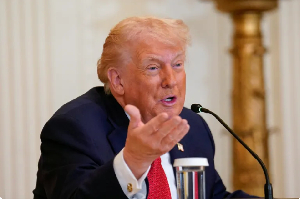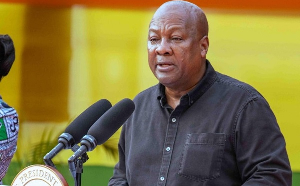Opoku Gakpo Writes: Blame no one but journalists for the unabated assaults on them
On Saturday, my colleague Lattif Iddrissu of Joy new was at Old Fadama, popularly called Sodom and Gomorrah, to cover demolitions by the Accra Metropolitan Assembly there. His camera man attempts taking shots of a bus load of some displaced residents being conveyed back to the north. A gentleman who claims to work at the presidency approaches them and demands they stop filming.
The next thing he realizes, the ‘so called’ presidential staffer calls around a number of gun wielding military and police persons. They hit Lattif left, right, center, bundle him in a police vehicle, and then conveyed him to the Tesano Police station where he was detained for about 30 minutes.
When I interviewed him on what transpired for our “Sunday Edition” show on Joy FM, you could hear the resentment and disdain in his voice, more than 24 hours after the incident had happened.
“It was a traumatizing experience and humiliating too. Gakpo, you know, there were people all over watching me… It was embarrassing” he said; with his breathe almost choking, his face boiling with rage, his eyes reddened with anger, and his body emanating an “enough is enough” heat.
You could understand his anger; this was the second attack on him at the slum in about a week. Days ago, some residents beat him while he was covering an earlier demolition and took away his phone.
Why should anyone be attacked just for doing his job in a country that has freedom and justice as its guiding principles? Even armed robbers are not being attacked this way in their line of duty these days.
This is just one of ‘a million and one’ such examples of attacks journalists have suffered in recent times that we’ve all wailed about, poured invectives on the attackers, sympathized with our colleague victims, and just left behind us and moved on.
But the guys in the health profession have earned my respect for how they handle abuses like this. If you would recall, sometime in February last year, a resident of Aboabo in Kumasi, Suweiba Moomen, made the news headlines after her new born baby went missing from the Komfo Anokye Teaching Hospital (KATH). The youth in her neighbourhood marched to the Obstetrics and Gynecology Department of the hospital in anger to beat up nurses and midwives there, accusing them of complicity in how the baby went missing. They even destroyed furniture and patients’ files at the hospital.
How did the health professionals respond? They vomited ‘acid and bitter water.” Led by members of Ghana Medical Association, the health workers at KATH called a strike, forcing a near shut down of the hospital which left sick persons who went there with life threatening conditions stranded. Then, I thought they were being too insensitive and pompous in their actions. But with the benefit of hindsight, I’m convinced whoever’s idea it was for them to call the strike, deserves a badge of honour.
The strike triggered an emergency meeting of the Regional Security Council. Some of the attackers were arrested by the police and charged with various offences. They family of Suweiba was forced to apologise to the affected health workers. The strike was called off after a week, when the health professionals were convinced security at the hospital had been beefed up. Till date, although sadly, Suweiba’s baby has still not been found, no one has found reason enough to go back and attack the health workers.
What does this tell all of us? The guys in the health profession love themselves; they stand shoulder to shoulder to defend each other in times of trouble; they believe an attack on one of them is an attack on all of them; and they believe the principle that says ‘if you see a neigbour’s beard burning, fetch water and put beside yours,’ is still relevant in this 21st century.
I don’t see that kind of posture on the part of journalists when some of them are attacked. Of the cuff, I remember incidents of assault on George Vinei, Afia Pokua, Kwakye Afreh Nuamah, Daniel Kenu, Vincent Dzatse, Nii Martey Botwe, and the list goes on and on in their line of duty. But how did the media, journalists and the mother association respond? By doing nothing. Except to dodge and run around the issue. Always hiding under the “it’s in the hands of the police” cliché to escape responsibility. When we all know stuff like these hardly pass through the hands of the police and come out any better.
No one is saying the media should call a strike like the health workers did. But when Accra Mayor Alfred Oko Vanderpuye caused the arrest of former Joy news’ reporter Joojo Kobina and his cameraman for interviewing residents at Mensah-Guinea whose homes had been demolished and were sleeping in the open, my former lecturer Prof. Kwame Karikari suggested a fantastic retaliatory measure.
“I think people like Oko Vanderpuye, the media should blacklist him. And shouldn’t cover him for a long time. And let’s see whether he would succeed in what he wants to do. The media has power. And they must show that power to such officials who take the law into their own hands and act with such impunity,” he said in an interview I had with him at the International Press Center.
Legal Practitioner Samson Lardi Ayenini has also been on a social media crusade encouraging journalists who are attacked by workers of identifiable institutions like the Bureau of National Investigations, Police, National Health Insurance Scheme, etc, to drag them to court for compensation to deter others from doing same. But who cares? No one. Not even the journalists themselves.
Currently, the media looks weak in the eyes of those who attack them. But it’s time to turn the page. I think it’s about time the media sent a clear message across that you cannot attack its people without consequence. The attacks are becoming too many, and it’s about time the media fought back. Journalists should not burry our heads in the sand and assume this storm too will pass one day, because it may never pass until a journalist is killed or maimed in line of duty. By then, it would be too late to act.
You can refuse to talk to the journalist, insult him or her, or do anything else. But laying your hands on them is a red line that should not be crossed. Crossing it is a steep slope down the abyss we would rather not want to push the fourth estate of the realm into.
The attacks are continuing because journalists and their media houses have failed in their responsibilities to protect themselves. And until they act, we can expect the next attack on another journalist in the coming days. I pray every morning that it’s not me. But speedy recovery in advance to whoever it would be.
May God bless our journalists, and may God bless Ghana.
By Joseph Opoku Gakpo
www.josephopokugakpo.wordpress.com
Opinions of Friday, 10 July 2015
Columnist: Gakpo, Joseph Opoku














